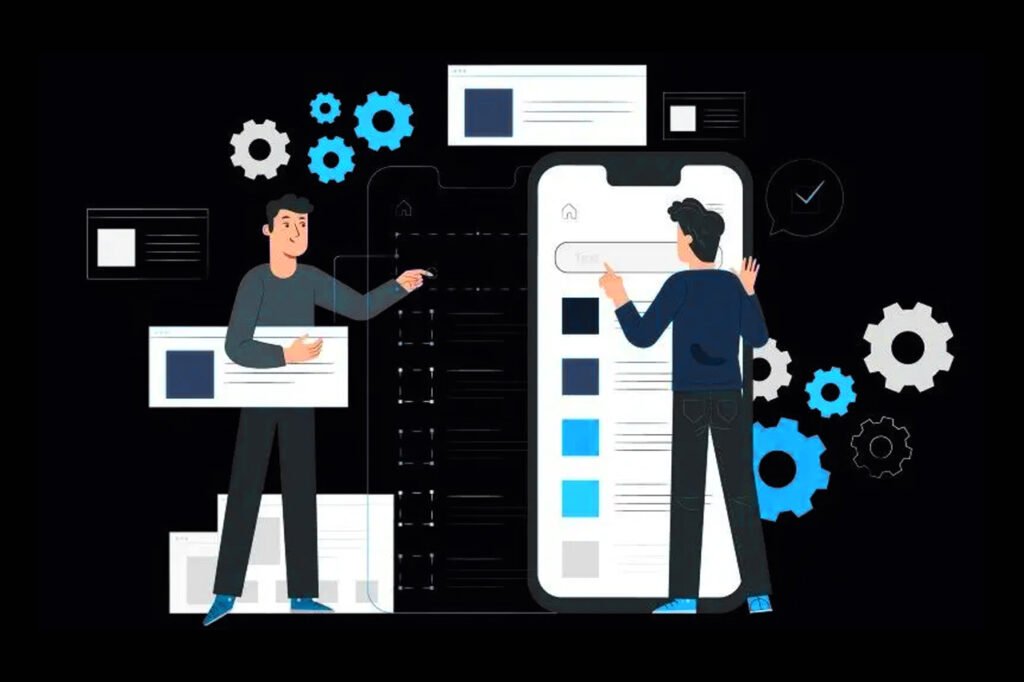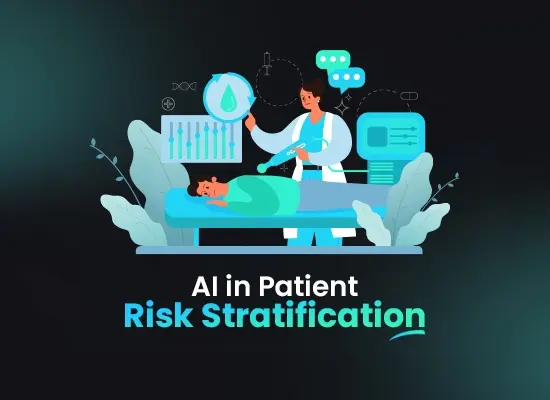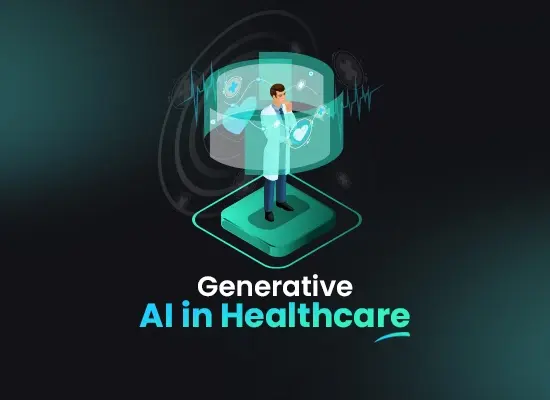Grow With Software Development Services – Excel Your Startup and Lead Along
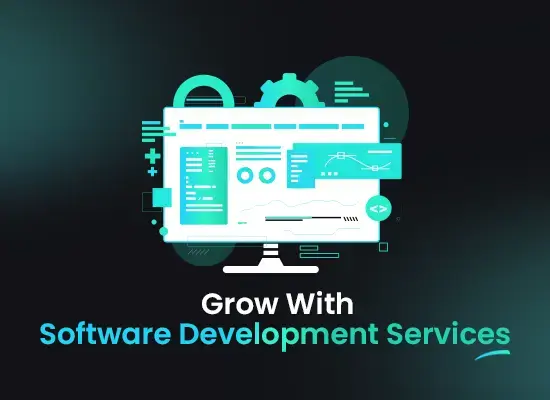
Why Custom Software Development Matters for Your Business Growth?
In today’s fast-paced, technology-driven landscape, software development services have become indispensable for businesses looking to excel. These services are no longer just an option but a necessity for companies aiming to stay competitive.
Whether it’s about developing mobile applications or automating complex business processes, software development services have revolutionized industries. They help by enhancing efficiency, streamlining operations, and driving continuous innovation.
Custom software development plays a critical role in fostering long-term growth. It adapts to the changing needs of businesses, offering tailored solutions that can grow alongside the company.
According to market research, the global software development market is projected to grow at a compound annual growth rate (CAGR) of 5.3%, reaching $507.23 billion by 2025. This underscores the growing demand for custom solutions in an increasingly digital world, where businesses must continually adapt to new technological advancements.
Key Takeaways:
- Understand the different types of software development services to choose the right one for your needs, such as custom solutions or industry-specific services.
- Consider outsourcing software development to save costs and access specialized skills, as highlighted in the outsourcing services section.
- For startups, focus on selecting a provider that offers flexible and scalable solutions to adapt as your business grows.
- Familiarize yourself with various software development methodologies to ensure efficient project management and delivery.
- Prioritize quality assurance in your projects to maintain high standards and customer satisfaction, as discussed in the quality assurance section.
- Keep an eye on future trends in software development to stay competitive and leverage new technologies effectively.
- Kodexo Labs’ contribution to helping businesses reach more than what they never would have thought of.
Seamless Collaboration | Cost-Efficient Solutions | Faster Time-to-Market

What Are Software Development Services?
Software development services refer to the process of creating software applications. These services include designing, coding, testing, and maintaining software. Companies often hire professionals to handle these tasks. This helps ensure high-quality products.
Different types of software development exist. Custom product development is one type. It involves building unique solutions for specific business needs. Off-the-shelf software is another option. This refers to ready-made programs that anyone can buy and use.
Developers use various programming languages for their work. Popular languages include Python, Java, and C#. Each language has its strengths. For instance, Python is known for being easy to learn. Java is widely used in enterprise environments.
Software development also involves different methodologies. Agile is a well-known approach. It focuses on flexibility and customer feedback during the development process. Waterfall is another method. It follows a linear path from planning to deployment.
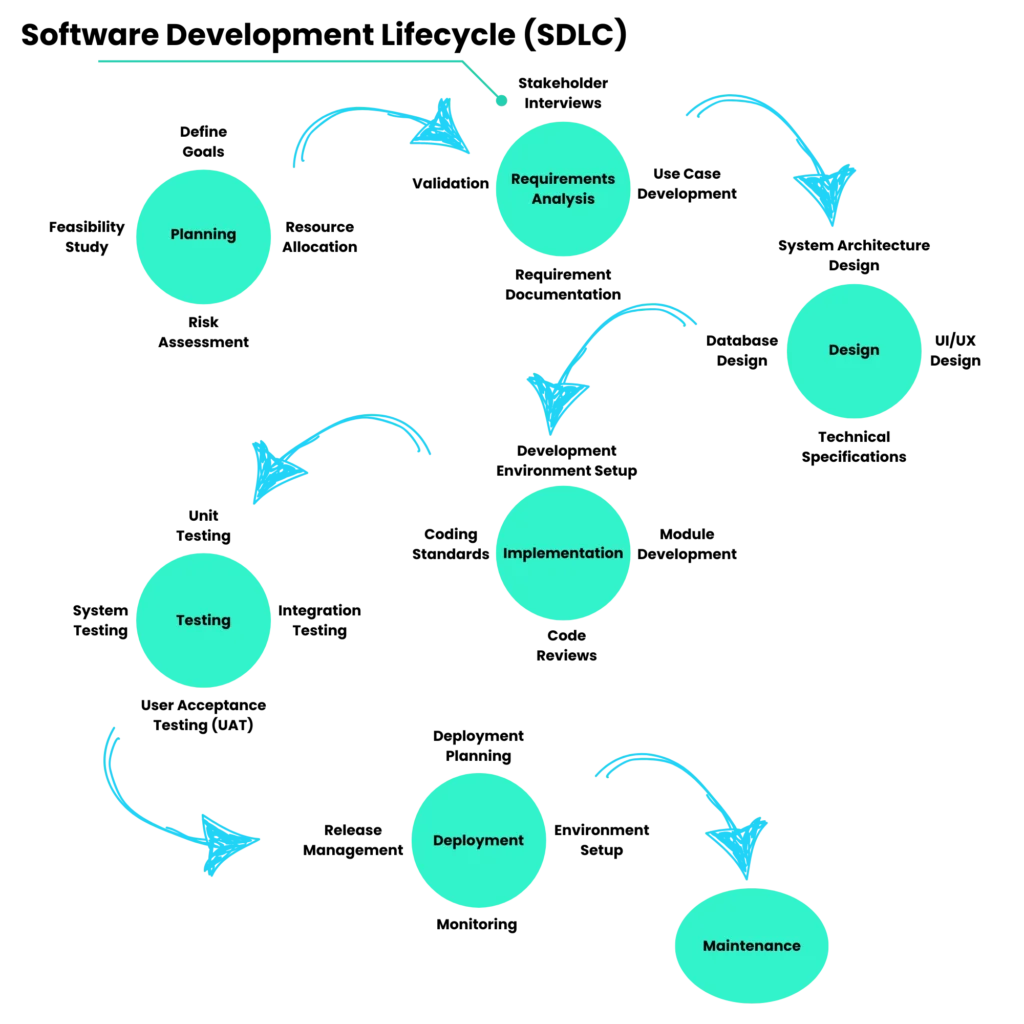
The Importance of Software Development Services in Modern Business:
Software development services play a crucial role in modern business operations. They enable companies to automate tasks, improve efficiency, and reduce human error, saving valuable time. Businesses can focus on core activities rather than repetitive tasks, which is essential for maintaining a competitive edge in today’s fast-paced market.
Custom software can provide a significant advantage by allowing companies to tailor solutions to their specific needs. For example, a retail company may require a unique inventory management system, whereas off-the-shelf solutions might not fit well with their processes. Additionally, companies are increasingly turning to software development for robust security measures, as cybersecurity threats are on the rise.
Investing in high-quality custom software development services leads to long-term benefits like flexibility, scalability, and security. Well-developed software can scale with the business as it grows, ensuring that companies don’t need to frequently overhaul their systems.
A recent Statista report noted that IT spending on enterprise software in 2023 reached around $913 billion, marking a 12.4% increase from the previous year. This underscores the critical role of software development in enabling businesses to remain competitive while addressing operational inefficiencies. According to market research, the global software development market is set to grow at a CAGR of 5.3%, reaching $507.23 billion by 2025, further highlighting the growing demand for custom solutions in an increasingly digital world.
Types of Software Development Services:
| Service Type | Pros | Cons |
|---|---|---|
| Custom Software Development Services | – Tailored to specific business needs – Competitive advantage through unique features – Scalability to grow with the business |
– Higher initial cost – Longer development time – Requires clear and detailed requirements |
| Bespoke Software Development Services | – Highly customized solutions – Better integration with existing systems – Enhanced user experience |
– Expensive compared to off-the-shelf solutions – Time-consuming development process – Ongoing maintenance required |
| Custom Enterprise Software Development Services | – Supports complex business processes – Enhances organizational productivity – Scalable for large operations |
– Significant initial investment – Complex implementation and integration – Requires comprehensive training for users |
| Custom Offshore Software Development Services | – Cost-effective labor rates – Access to a global talent pool – Potential for 24/7 development cycles |
– Communication barriers due to language and cultural differences – Time zone challenges – Potential quality control issues |
| Custom Software Application Development Services | – Specific functionality tailored to user needs – Flexibility in feature development – Ability to adapt to changing requirements |
– Extended development timelines – Risk of scope creep without proper management – Higher costs for specialized features |
| Enterprise Software Development Services | – Robust solutions for large-scale operations – High scalability and reliability – Comprehensive support and maintenance |
– High costs associated with development and licensing – Lengthy implementation periods – May require significant changes to existing workflows |
| Software Product Development Services | – Market-driven solutions with potential for recurring revenue – Ability to reach a wide audience – Continuous improvement based on user feedback |
– High competition in the market – Requires ongoing updates and support – Initial investment can be substantial |
| MVP Software Development Services | – Faster time to market with minimal viable features – Lower initial investment – Validates product ideas with real users quickly |
– Limited functionality may not fully meet user needs – May require significant changes based on feedback – Risk of not attracting enough users initially |
| Software Application Development Services | – Diverse options tailored to various platforms (web, mobile, desktop) – Can be customized for different industries – Flexibility in technology stack |
– Quality varies depending on the provider – May require ongoing maintenance and updates – Potential for compatibility issues across platforms |
Custom Software Development Services:
Custom software development services focus on creating unique solutions tailored to specific needs. Companies often seek these services when off-the-shelf software does not meet their requirements. This type of development helps businesses improve efficiency and productivity. A prediction states that he global custom software development market size is expected to rise at a CAGR of 22.5% (2024-2030), with a revenue forecast of $146.18 billion. This significant growth underscores the increasing reliance on personalized software solutions that enhance operational efficiency and drive business outcomes.
Bespoke software development services are a key part of this category. These services involve designing and building software from scratch. Developers work closely with clients to understand their goals. They create a product that fits perfectly, addressing all user needs.
Custom enterprise software development services cater to larger organizations. These solutions help manage complex operations. They often include features like data management, data engineering services, reporting, and integration with existing systems. Such software supports growth and scalability within the business.
According to Statista, in 2023, IT spending on enterprise software amounted to around 913 billion U.S. dollars worldwide, a growth of 12.4 percent from the previous year.
Custom offshore software development services have gained popularity in recent years. Companies outsource their software needs to countries with lower labor costs. This approach can reduce expenses while still delivering high-quality products. Communication and project management are crucial in ensuring success in these projects.
Custom software application development services focus on specific applications. These can range from mobile apps to web-based platforms. Developers aim to create user-friendly interfaces and seamless functionality. The goal is to enhance user experience while meeting business objectives.
Enterprise Software Development Services:
Enterprise software development services address the needs of large organizations. These services provide solutions for managing various business processes. Examples include customer relationship management (CRM) and enterprise resource planning (ERP) systems. Up to 84.7% of software companies specialize in enterprise app development for customers.
Such software enhances collaboration among departments. It allows teams to share information easily, leading to better decision-making. With real-time data access, employees can respond quickly to changes in the market.
Integration is a significant aspect of enterprise software development. New systems must work well with existing tools. This ensures that businesses can maintain their workflows without disruption.
Software Product Development Services:
Software product development services involve creating market-ready products. Companies may seek these services when launching new ideas or improving existing ones. The process includes research, design, development, and testing.
Developers follow a structured approach during this process. They gather feedback from users to refine the product before launch. This iterative method helps ensure that the final product meets market demands.
Successful software products often require ongoing support and updates after launch. Companies must address bugs and add new features based on user feedback. This support is essential for maintaining customer satisfaction over time.
MVP Software Development Services:
MVP software development services focus on creating a Minimal Viable Product (MVP). An MVP includes only the core features necessary for initial launch. This approach allows companies to test ideas quickly and gather user feedback.
Building an MVP helps reduce time and costs associated with full product development. Companies can validate concepts before investing heavily in additional features. Feedback from early users guides further development efforts.
This process encourages innovation by allowing rapid adjustments based on real-world use. Many successful startups began with an MVP approach, refining their offerings over time.
Software Application Development Services:
Software application development services cover a wide range of applications. These can be desktop applications, mobile apps, or web applications designed for specific tasks or functions.
Research conducted by a source states that mobile app alone generated roughly 8.4 billion downloads in the Apple App Store.
Developers must consider various factors when creating applications. User interface design is crucial for usability and engagement. Performance optimization ensures that applications run smoothly across devices.
Testing is another vital step in application development. Rigorous testing helps identify bugs before launch, minimizing issues for users later on. Ongoing maintenance keeps applications updated with the latest technology trends.
Industry-Specific Software Development Services:
| Industry | Benefits |
|---|---|
| Healthcare | – Improved Patient Care: Electronic Health Records (EHR) streamline patient data management. – Operational Efficiency: Automation of administrative tasks reduces errors and saves time. |
| Financial | – Enhanced Security: Robust software solutions protect against fraud and cyber threats. – Automated Transactions: Streamlines payment processing and financial operations. – Data Analytics: Provides insights for better decision-making and risk management. – Customer Experience: Improves user interfaces for online banking and financial services. – Regulatory Compliance: Assists in meeting financial regulations and reporting requirements. |
| Education | – E-Learning Platforms: Facilitates online learning and access to educational resources. – Administration Automation: Simplifies enrollment, grading, and attendance tracking. – Interactive Tools: Enhances student engagement through multimedia and interactive applications. – Data Management: Efficient handling of student records and performance metrics. – Scalability: Supports growth and adaptation to new educational trends and technologies. |
| Real Estate | – Property Management: Streamlines listing, tracking, and managing properties. – Customer Relationship Management (CRM): Enhances client interactions and sales processes. – Virtual Tours: Provides immersive experiences for property viewing remotely. – Data Analytics: Offers market insights and trends to inform investment decisions. – Automation: Simplifies tasks such as scheduling, documentation, and reporting. |
| E-commerce | – User Experience: Customizable platforms enhance customer satisfaction and retention. – Inventory Management: Optimizes stock levels and supply chain operations. – Personalization: Tailors product recommendations and marketing to individual users. – Secure Transactions: Ensures safe and reliable payment processing. – Scalability: Supports business growth and increased traffic without compromising performance. |
| Logistics | – Supply Chain Optimization: Enhances tracking and management of goods from origin to destination. – Route Planning: Improves efficiency and reduces transportation costs. – Inventory Management: Provides real-time visibility into stock levels and movement. – Automation: Streamlines warehousing, order processing, and delivery operations. – Data Analytics: Offers insights for better forecasting and decision-making. |
| Energy | – Smart Grid Management: Enhances monitoring and control of energy distribution. – Predictive Maintenance: Reduces downtime and extends the lifespan of equipment. – Energy Efficiency: Optimizes usage and reduces waste through data-driven insights. – Regulatory Compliance: Ensures adherence to environmental and safety standards. – Data Analytics: Provides valuable insights for resource management and strategic planning. |
Healthcare Software Development Services:
Healthcare software development focuses on creating applications for medical professionals. These applications help manage patient data, appointments, and treatments. They ensure compliance with regulations like HIPAA in the United States.
Medical software development services include electronic health records (EHR) systems. EHR systems store patient information securely. They allow doctors to access patient history quickly. This improves the quality of care.
Telemedicine is another important area. It allows patients to consult with doctors online. This service became crucial during the COVID-19 pandemic. It helps people access healthcare without leaving home.
Recently AI in Radiology and Symptom Diagnosis through AI have excelled in the healthcare industry with a promising future application. Not only that, medical imaging for efficient diagnostics through artificial intelligence is helping doctors, save lives at stakes. Scientists are identifying use cases of AI software to predict disease outbreaks and prevent another pandemic from occurring, which will save millions of human lives.
Financial Services Software Development:
Software development for financial services supports banking and investment needs. This sector requires high security and reliability. Developers create applications that handle sensitive financial data.
Finance software development services offer tools for budgeting and accounting. These tools help businesses track their income and expenses easily. They can also generate reports for better financial planning.
Fintech software development services focuses on technology-driven financial solutions. Examples include mobile payment apps and investment platforms. These apps make transactions faster and more accessible.
A research over investment in software development has proved that businesses investing in software development have reported 20% growth in revenue on average.
Banking software development services include online banking portals. Customers can check balances, transfer funds, and pay bills anytime. These features enhance customer convenience and satisfaction.
Insurance software development services streamline policy management. Insurers can process claims efficiently through specialized applications. This reduces paperwork and speeds up service delivery.
Educational Software Development Services:
Educational software development services create tools for learning environments. Schools, colleges, and universities use these tools to enhance education. They provide interactive learning experiences for students.
Elearning software development focuses on online courses and training programs. These platforms allow learners to study at their own pace. They often include quizzes, videos, and discussion forums for engagement.
Real Estate Software Development Services:
Real estate software development creates applications for property management. Agents use these tools to list properties, manage leads, and communicate with clients. They improve efficiency in buying or selling homes.
Retail Software Development Services:
Retail software development helps businesses manage sales and inventory. Applications can track stock levels automatically. This ensures that popular items are always available for customers.
Ecommerce Software Development Services:
Ecommerce software development enables online shopping platforms. These platforms allow customers to browse products, add them to carts, and make payments easily. Security is crucial in this area to protect personal information.
Logistics Software Development Services:
Logistics software development focuses on supply chain management. Companies need these tools to track shipments and manage inventory effectively. Accurate tracking reduces delays and improves customer satisfaction.
Supply chain software development services optimize logistics operations. They provide real-time data on inventory levels and shipment statuses. Businesses can respond quickly to changes in demand or supply disruptions.
Energy Software Development Services:
Energy software development creates solutions for managing energy resources. Companies use these tools to track consumption and improve efficiency. Smart grid technologies are a key focus area in this field.
Specialized Software Development Services:
| Service Type | Description | Market Valuation & Growth | Key Benefits | Notable Examples |
|---|---|---|---|---|
| AI Software Development Services | Focuses on creating applications that can learn and adapt using machine learning, natural language processing, and computer vision. Enhances products and decision-making. | In 2020, valued at ~$39.9 billion; projected to exceed $300 billion by 2026. | – Process Automation: Saves time and reduces costs. – Enhanced Customer Experience: Personalized recommendations. – Improved Data Analysis: Better insights. | Netflix: Uses AI to suggest movies based on viewing history. IBM Watson: AI solutions for various industries. |
| Blockchain Software Development Services | Develops secure and transparent systems for transactions by recording data across multiple computers, making it difficult to alter or hack information. | Introduced in 2008 with Bitcoin; widely adopted across financial services, supply chain, healthcare, etc. | – Increased Security: Data encryption. – Enhanced Transparency: All participants can view transactions. – Cost Reduction: Eliminates intermediaries. | IBM Food Trust: Tracks food products from farm to table. Ethereum: Decentralized applications and smart contracts. |
| Embedded Software Development Services | Creates specialized software for devices with hardware components, such as appliances, medical equipment, and automotive systems, ensuring proper performance and control. | Valued at $92 billion in 2021; expected to grow rapidly with the rise of smart devices. | – Efficiency: Optimized for specific hardware. – Reliability: Ensures continuous operation. – Customization: Tailored to device-specific needs. | Smart Thermostats: Learn user preferences and adjust temperatures automatically. Automotive Systems: Control vehicle functions. |
| CRM Software Development Services | Helps businesses manage customer relationships by storing information and tracking interactions across channels, improving communication and sales strategies. | Valued around $40 billion in 2021; continues to expand as businesses prioritize customer relationships. | – Centralized Database: Easy access for sales and support teams. – Enhanced Data Analysis: Identifies trends and opportunities. – Improved Communication: Streamlines interactions across channels. | Salesforce: Comprehensive CRM solutions. HubSpot CRM: User-friendly CRM for various business sizes. |
AI Software Development Services:
AI software development services focus on creating applications that can learn and adapt. These services include machine learning, natural language processing, and computer vision. Companies use AI to enhance their products and improve decision-making.
In 2020, the global AI market was valued at approximately $39.9 billion. Experts project it will grow to over $300 billion by 2026. This growth shows how vital AI is becoming in various industries.
Businesses seek AI software development for several reasons. First, it automates processes, saving time and money. Second, it improves customer experiences through personalized recommendations. Third, it enhances data analysis, leading to better insights. For example, Netflix uses AI to suggest movies based on viewing history.
Blockchain Software Development Services:
Blockchain software development services create secure and transparent systems for transactions. Blockchain technology records data across multiple computers. This makes it difficult to alter or hack information.
In 2008, Bitcoin introduced blockchain to the world. Since then, many industries have adopted this technology for various uses. Financial services, supply chain management, and healthcare are just a few examples.
Companies benefit from blockchain in many ways. It increases security by encrypting data. It also enhances transparency since all participants can view transactions. It reduces costs by eliminating intermediaries in transactions. For instance, IBM’s Food Trust uses blockchain to track food products from farm to table.
Embedded Software Development Services:
Embedded software development services create specialized software for devices with hardware components. These devices include appliances, medical equipment, and automotive systems. The software controls the device’s functions and ensures proper performance.
The embedded systems market was valued at $92 billion in 2021 and is expected to grow rapidly. This growth reflects the increasing number of smart devices in our lives.
Developers design embedded software with specific requirements in mind. They focus on efficiency and reliability since these systems often run continuously. For example, smart thermostats use embedded software to learn user preferences and adjust temperatures automatically.
CRM Software Development Services:
CRM software development services help businesses manage customer relationships effectively. These systems store customer information and track interactions across channels. Companies use CRM software to improve communication and enhance sales strategies.
The global CRM market was valued at around $40 billion in 2021 and continues to expand. Many businesses recognize the importance of maintaining strong customer relationships.
CRM systems offer several benefits for companies. They provide a centralized database for customer information. This allows easy access for sales teams and support staff. Enhanced data analysis helps identify trends and opportunities in customer behavior. As a result, businesses can tailor their marketing efforts more effectively.
Specialized Software Development Services:

Outsourcing Software Development Services:
Outsourcing software development services has become common. Companies seek to reduce costs and improve efficiency. By outsourcing, businesses can access specialized skills without hiring full-time employees. This method allows for flexibility in project management.
Many companies choose to outsource their software needs to focus on core activities. This approach helps them save time and resources. For example, a startup might not have the budget for an in-house team. Instead, they can hire an external agency to handle their software projects.
Outsourced services can cover various areas. These include web development, mobile app creation, and software maintenance. Businesses can select specific tasks to outsource based on their needs. This strategy enables them to scale operations quickly.
In 2022, the IT outsourcing industry expanded, reaching a spending amount of $4.4 trillion. The industry is prevalent among businesses worldwide. Around 24% of business professionals outsource their software development teams.
Outsource Software Development Services:
To outsource software development services effectively, companies need a clear plan. First, they should define their project requirements. Knowing what is needed helps in selecting the right partner.
Next, organizations must research potential vendors. They should look for companies with experience and positive reviews. A good vendor will provide case studies that show their past work. This information builds trust and confidence.
Finally, establishing communication is vital. Regular updates ensure everyone is on the same page. It also helps address any issues that arise during the project. Effective communication leads to successful outcomes.
Outsourced Software Development Services:
Outsourced software development services offer many benefits. Cost savings is a primary advantage. Companies can save money by hiring teams in countries with lower labor costs.
Access to global talent is another benefit of outsourcing. Companies can find experts in various fields, such as Artificial Intelligence or cybersecurity. This access enhances the quality of the final product. Artificial intelligence (AI) in software is estimated to generate $126 billion in revenue by the end of 2025.
Flexibility is also crucial when using outsourced services. Organizations can adjust their workforce based on project demands. If a project requires more developers temporarily, they can hire additional help easily.
Notable Examples for Outsourcing Software Development Services:
- Startups: Many startups opt to outsource their software development to external agencies to conserve capital and access high-quality development services without the overhead of hiring full-time staff.
- Tech Companies: Established tech firms often outsource specialized tasks such as AI development or cybersecurity to enhance their product offerings and maintain competitive advantage.
- Flexible Workforce Management: Businesses can efficiently manage fluctuating project demands by outsourcing, allowing them to scale their teams as needed without long-term commitments.
- Case Study Example: A startup with limited resources collaborates with an external agency to develop a mobile application, enabling a quick market launch and iterative improvements based on user feedback without the financial burden of building an in-house team.
| Category | Details |
|---|---|
| Description | – Outsourcing software development to external agencies. – Reduces costs and improves efficiency – Access specialized skills without full-time hires – Includes web, mobile, and maintenance services |
| Market Data | – 2022 Spending: $4.4 trillion – 24% of business professionals outsource software development – AI Revenue: $126 billion by 2025 |
| Benefits | – Cost Savings: Lower labor costs – Global Talent: Experts in AI, cybersecurity, etc. – Flexibility: Scale workforce as needed – Efficiency: Focus on core activities |
| Best Practices | – Define Requirements: Clear project scope – Research Vendors: Experienced and well-reviewed – Communication: Regular updates – Task Selection: Align with business goals |
| Notable Examples | – Startups: Hire external agencies for budget-friendly development – Tech Firms: Outsource AI and Machine Learning development for specialized tasks – Case Study: Startup outsources mobile app development for quick launch |
Offshore Software Development Services:
Offshore software development services are popular among businesses looking for cost-effective solutions. Many companies turn to countries like India or Ukraine for these services. They offer skilled developers at lower rates compared to local markets.
There are challenges with offshore outsourcing as well. Time zone differences can create delays in communication. Language barriers may lead to misunderstandings about project requirements.
Despite these challenges, many firms find success with offshore teams. They often achieve faster turnaround times and innovative solutions by leveraging diverse perspectives.
Nearshore Software Development Services:
Nearshore software development services provide a middle ground between local and offshore options. Companies often choose nearby countries for better collaboration and communication.
For instance, U.S.-based companies may work with teams in Mexico or Canada. These locations share similar time zones and cultural understanding, which eases collaboration.
Nearshore outsourcing offers several advantages. Reduced travel costs make it easier for teams to meet face-to-face when necessary. Businesses enjoy quicker response times due to geographical proximity.
Software Development Consulting Services:
Understanding Software Development Consulting Services:
Software development consulting services help businesses improve their software projects. These services provide expert advice on how to design, build, and maintain software systems. Companies often face challenges in meeting their goals. Consultants offer solutions tailored to specific needs.
Consultants assess existing systems and identify areas for improvement. They analyze business processes and suggest better practices. This analysis helps organizations understand their software requirements more clearly. Effective communication is key in this process.
Many companies seek software consulting when launching new projects. They may lack the necessary skills or resources internally. A consultant can guide them through the entire development lifecycle. This includes planning, execution, testing, and deployment. With expert guidance, businesses can avoid common pitfalls.
Benefits of Software Development Consulting Services:
Software development consulting services provide several advantages. First, they offer access to specialized knowledge. This expertise can lead to higher quality software products. Companies benefit from the experience consultants bring to the table.
Consultants also help save time and money. By identifying issues early, they prevent costly mistakes. They streamline processes and ensure efficient use of resources. This efficiency can significantly reduce project timelines.
Another benefit is increased flexibility. Businesses can adjust their strategies based on market demands. Consultants help organizations adapt quickly to changes in technology or user needs. This adaptability is crucial in today’s fast-paced environment.
Here are some key benefits of using software development consulting services:
- Expert Guidance: Consultants provide insights based on industry best practices.
- Cost Efficiency: Early problem identification saves money in the long run.
- Quality Assurance: Expert reviews enhance the overall quality of software.
- Faster Time-to-Market: Streamlined processes speed up project delivery.
- Scalability: Consultants help design systems that grow with the business.
Software Development Services for Startups:
Custom Software Development Services for Startups:
Startups often face unique challenges. They need software that fits their specific goals. Tailored software development services help them create solutions aligned with their vision. These services focus on flexibility and adaptability.
Custom software development allows startups to build applications from scratch. This process ensures that the software meets their exact needs. For example, a startup in e-commerce may require a unique shopping cart feature. A tailored solution will provide this without unnecessary features that complicate the user experience.
Another important aspect is scalability. Startups grow quickly, and their software must keep up. Developers can design systems that expand as the business grows. This means they can add new features or increase capacity without starting over.
Cost-effectiveness is also key for startups. Off-the-shelf software might seem cheaper initially, but it often comes with hidden costs. Custom solutions reduce these long-term expenses by eliminating licensing fees and unnecessary upgrades.
Why Startups Need Dedicated Software Development Services?
Dedicated software development services offer numerous advantages for startups. First, they provide access to skilled professionals. Many startups lack in-house expertise in software development. By outsourcing, they gain a team of experts who understand current technologies.
These dedicated teams work closely with the startup’s founders. They align the development process with business goals. This collaboration ensures that every feature serves a purpose and enhances the product.
Time-to-market is crucial for startups. They need to launch quickly to capture market share. Dedicated software development teams can expedite this process. They follow agile methodologies, allowing for rapid iterations and adjustments based on feedback.
Startups also benefit from ongoing support and maintenance. Once the product launches, issues will arise. A dedicated team can address problems swiftly, ensuring minimal downtime.
Moreover, security is a significant concern for startups handling sensitive data. Dedicated developers understand best practices in cybersecurity. They implement measures to protect user information against breaches.
In summary, tailored software development services are essential for startups. These services provide custom solutions that fit their unique needs and support their growth journey.
Software Development Company Services:
Software Development Services Company:
A software development services company provides various solutions tailored to meet client needs. These companies design, build, and maintain software applications. They also offer support and updates for existing software.
Most software development companies focus on specific areas. Some specialize in mobile application development. Others concentrate on web applications or enterprise solutions. Companies often choose a niche to stand out in the market. A report suggests that in the most recent quarter, the total value of global consumer spend on mobile apps amounted to $35.34 billion.
Many firms use Agile methodology. This approach promotes flexibility and collaboration. It allows teams to adapt to changes quickly. Regular feedback from clients helps improve the final product. This process keeps projects aligned with client expectations.
Software Development Company Services:
Services offered by a software development company vary widely. Common services include custom software development, mobile app development, and web app development. Each service targets different business needs.
- Custom software development creates unique applications for specific requirements.
- Mobile app development focuses on creating apps for smartphones and tablets.
- Web development involves building websites and online platforms.
Software companies provide additional services like cloud computing solutions and software integration. Cloud computing allows businesses to access data and applications over the internet securely. Software integration connects various systems, ensuring they work together smoothly.
Quality assurance is another critical service offered by these companies. It ensures that software is reliable and free of bugs before release. Testing includes unit tests, integration tests, and user acceptance tests. This thorough process builds trust with clients.
Get Help from Software Development Services Companies:

Choosing the right software development services company is crucial for success. Different companies have different strengths and weaknesses. Businesses should evaluate potential partners based on their experience and expertise.
Many successful companies have a proven track record in the industry. They can showcase case studies or testimonials from previous clients. This evidence demonstrates their ability to deliver quality results.
Cost is another important factor when selecting a software development partner. Prices can vary significantly between companies. Businesses should compare quotes while considering the quality of work offered.
Communication plays a vital role in any partnership. Good software development companies maintain open lines of communication with clients. Regular updates help keep everyone informed about project progress.
Once you have considered a product, opt out for the best software development services. Did you know that Kodexo Labs has been the choice of 8 out of 10 people when it comes to software development? Yes, it’s actually true. Kodexo Labs’ AI software development has helped businesses achieve more than they ever thought.
Currently, Kodexo Labs has delivered two AI chatbots this season; Kodexia and Smart Medical History. Even more AI chatbots are on their way. But Kodexo Labs’ AI chatbot development is not bound by any barriers – Teacher AI was also developed by Kodexo Labs and has generated above $26 million in revenue. Do you wish to be among the ones who leveled up their game or would you let this opportunity slide too?
Software Development Methodologies:
| Methodology | Description | Key Features | Benefits | Best Suited For |
|---|---|---|---|---|
| Agile | Iterative approach emphasizing flexibility and customer feedback. | – Sprints (2-4 weeks) – Daily stand-ups – High collaboration | – Adaptable to changes – Enhanced customer satisfaction – Early issue detection | Projects needing flexibility and frequent client input |
| Java Development | Utilizes Java for versatile, secure, and cross-platform applications. | – Cross-platform – Strong security – Extensive libraries | – Versatile for web/mobile – Secure for enterprise – Efficient development | Enterprise applications, web and mobile apps |
| Waterfall | Linear and sequential approach with defined phases. | – Sequential phases – Comprehensive documentation | – Clarity and simplicity – Predictable timelines | Projects with well-defined requirements |
| Scrum | Agile framework with defined roles and iterative sprints. | – Time-boxed sprints – Roles: Scrum Master, Product Owner – Artifacts: Backlogs | – Improved teamwork – Transparency – Continuous improvement | Agile projects requiring structured roles |
| DevOps | Combines development and operations for continuous integration and delivery. | – CI/CD – Automation – Continuous monitoring | – Faster delivery – Enhanced collaboration – Higher quality | Projects needing rapid deployment and continuous updates |
| Lean | Focuses on minimizing waste and maximizing value. | – Value stream mapping – Continuous improvement – Waste elimination | – Increased efficiency – Customer-focused – Flexible processes | Projects aiming for efficiency and cost reduction |
| RAD | Emphasizes quick prototyping and iterative development. | – Rapid prototyping – Iterative cycles – User feedback | – Fast development – High flexibility – Active user engagement | Projects requiring quick turnaround and adaptability |
Agile Software Development Services:
Agile is a popular approach in software development. It focuses on flexibility and customer feedback. Teams work in small cycles called sprints. Each sprint lasts about two to four weeks. This allows for quick adjustments based on user needs.
The Agile method promotes collaboration among team members. Daily meetings keep everyone informed. Developers, designers, and stakeholders share updates regularly. This transparency helps identify issues early. Teams can then adapt quickly to changes.
One key benefit of Agile is its emphasis on customer involvement. Clients can review progress at the end of each sprint. They provide feedback that shapes future work. This leads to a product that better meets their needs. Many companies prefer Agile for its adaptability and speed.
Java Software Development Services:
Java remains one of the most widely used programming languages. Its versatility makes it suitable for various applications. Companies often choose Java for building web and mobile applications. This language supports cross-platform functionality, which means it works on different devices.
Java has strong security features, making it ideal for enterprise-level software. Many businesses trust Java for handling sensitive data. It also has a vast ecosystem of libraries and frameworks. These tools help developers create applications faster and more efficiently.
Java software development services often include custom application development. Developers create solutions tailored to specific business needs. This can range from simple apps to complex systems integrated with existing infrastructure. The demand for skilled Java developers continues to grow in the tech industry.
Other Key Methodologies in Software Development Services:
Several other methodologies play important roles in software development services. Each has its unique strengths and processes.
- Waterfall: This is a traditional method where each phase must be completed before moving to the next one. It’s straightforward but lacks flexibility.
- Scrum: Scrum is an Agile framework that breaks projects into smaller tasks called “sprints.” It emphasizes teamwork and accountability.
- DevOps: DevOps combines development and operations teams to improve collaboration and efficiency. This methodology focuses on continuous integration and delivery.
- Lean: Lean methodology aims to reduce waste while maximizing value to the customer. It encourages efficient processes and practices.
- Rapid Application Development (RAD): RAD focuses on quick prototyping over lengthy development cycles. It’s useful for projects needing fast results.
Each methodology has pros and cons, depending on project needs:
- Pros:
- Agile offers flexibility.
- Java provides strong security.
- Scrum enhances teamwork.
- Cons:
- Waterfall lacks adaptability.
- DevOps requires cultural shifts.
Choosing the right methodology is crucial for success in software development projects. Understanding project goals helps teams select the best approach.
Services in Software Development:
Comprehensive Overview of Services in Software Development:
Software development services cover a wide range of activities. These services help create, maintain, and improve software applications. Each service plays a crucial role in the overall development process.
One major service is custom software development. This involves tailoring software to meet specific needs. Companies often require unique solutions that off-the-shelf software cannot provide. Custom software helps businesses gain a competitive edge.
Another important service is software testing. Testing ensures that the software works correctly. It identifies bugs before the software reaches users. This process includes various types of testing, such as unit testing and integration testing. Each type focuses on different aspects of the software.
In 2023, the total consumer spend on mobile apps was of approximately $171 billion, says Statista. Mobile app development has gained popularity in recent years. Businesses want to reach customers on their smartphones and tablets. Mobile apps can enhance user experience and engagement. Developers use different platforms like iOS and Android for these applications.
Web development is another key area within software services. Websites must be functional, user-friendly, and visually appealing. Developers use languages like HTML, CSS, and JavaScript to build these sites. They also ensure that websites are optimized for search engines.
Cloud computing services have become essential. Cloud technology allows businesses to store data online instead of on local servers. This approach offers flexibility and scalability. Companies can access their data from anywhere with an internet connection.
Lastly, DevOps services combine development and operations. This method streamlines the development process. It promotes collaboration between teams, improving efficiency and reducing time-to-market for new features.
What Various Services in Software Development Interconnect?
Different software development services often overlap and support each other. Understanding how they interconnect is vital for successful project execution.
For instance, custom software development relies heavily on effective project management services. Project managers coordinate tasks and resources throughout the development cycle. They ensure that all teams work towards common goals while meeting deadlines.
Did you know? According to Statista, Jira is the most-used tool for managing software development projects by 50%.
Testing integrates closely with both custom development and web development services. Developers need feedback during the creation process to make necessary adjustments. Continuous testing helps catch issues early, leading to better final products.
Mobile app development often requires collaboration with web developers too. Many companies aim for a seamless experience across devices. This means ensuring that mobile apps and websites work well together.
Cloud computing services also connect with various aspects of software development. Developers need to consider cloud infrastructure when building applications. They must ensure that apps can function effectively in a cloud environment.
Furthermore, DevOps practices enhance communication among all teams involved in software projects. By fostering collaboration, DevOps allows for faster releases and improved product quality.
In summary, all these services play interlinked roles in software development projects. A strong understanding of these connections leads to more efficient workflows.
Customization and Flexibility in Software Development:
| Criteria | Bespoke Software Development | Custom Software Development |
|---|---|---|
| Budget | – Higher initial investment – Suitable for larger budgets | – More cost-effective – Ideal for moderate budgets |
| Timeline | – Longer development cycles – Extensive planning required | – Shorter timelines – Faster deployment |
| Unique Requirements | – Fully tailored to specific needs – Addresses unique challenges | – Modifies existing solutions – Limited to enhancing current features |
| Scalability | – Highly scalable for future growth – Designed for long-term use | – Scalable within existing frameworks – May require updates for significant growth |
| Flexibility | – High flexibility to adapt to any changes – Custom workflows | – Moderate flexibility – Dependent on base software capabilities |
| Maintenance | – Requires dedicated maintenance – Greater control over updates | – Easier maintenance using existing platforms – Dependent on vendor support |
| Integration | – Seamless integration with existing systems – No compatibility issues | – Integrates with existing software – Potential compatibility challenges |
| User Involvement | – High level of stakeholder involvement – Continuous feedback | – Regular updates with user feedback – Limited involvement compared to bespoke |
| Long-Term Support | Comprehensive support tailored to specific needs | – Standard support based on the base software provider |
| Risk Management | – Lower risk of functionality gaps – Complete control over development | – Potential risks related to dependency on base software – Limited customization may not fully address all needs |
Bespoke vs. Custom Software Development Services:
Bespoke software development focuses on creating a solution tailored to specific user needs. This type of software is built from scratch. It addresses unique requirements that off-the-shelf solutions cannot meet. Companies often choose bespoke development for its personalized approach.
Custom software development, on the other hand, modifies existing software to fit particular business processes. It offers a balance between customization and cost-effectiveness. Businesses can save time by using pre-built solutions as a base. Both options provide flexibility but serve different purposes.
The choice between bespoke and custom development depends on several factors. Budget plays a crucial role. Bespoke solutions usually require more investment due to their complexity. Custom services might be less expensive, especially if they build on existing frameworks.
Another factor is the timeline for delivery. Bespoke development takes longer because it involves creating everything from the ground up. Companies needing quick solutions may prefer custom development. They can adapt existing tools to meet their needs faster.
Businesses should also consider scalability when choosing between these options. Bespoke solutions can be designed for future growth, ensuring they remain relevant as needs change. Custom software may require updates or changes as the business evolves, which could lead to additional costs down the line.
Adapting Custom Software Development Services to Business Needs:
Custom software development services can be tailored to fit any business model or industry. Understanding specific requirements is essential for effective adaptation. Companies must first identify their goals. They need to understand what problems they aim to solve with the software.
Once goals are clear, businesses can outline necessary features and functionalities. This process ensures that the final product aligns closely with operational needs. For example, a retail company might need an inventory management system integrated with e-commerce functions.
Collaboration between developers and stakeholders is critical during this phase. Regular feedback helps refine the project scope and direction. Developers can adjust features based on input from users throughout the process.
Flexibility in design is another important aspect of custom software services. Developers often use agile methodologies, allowing them to make changes quickly. This means businesses can pivot as market conditions change or new opportunities arise.
Testing is another key component of adapting custom software. Regular testing ensures that the product meets quality standards before deployment. Feedback gathered during testing phases allows further refinements.
Training staff on new systems is equally important for successful implementation. A well-trained team will use the software effectively, maximizing its benefits. Custom training sessions tailored to specific roles within the company enhance understanding and efficiency.
Finally, ongoing support is vital after deployment. Businesses need assurance that issues will be addressed promptly post-launch. Custom software providers often offer maintenance packages to ensure long-term success.
Technology Stack in Software Development Services:
Choosing the Right Technology for Software Development Services:
Developers must select the right technology stack for their projects. The technology stack refers to the combination of programming languages, frameworks, libraries, and tools used in software development. Each project has different needs. A good choice can enhance performance and maintainability.
First, understanding the project requirements is crucial. Some projects need high performance and speed. Others may focus on user experience or scalability. For instance, a gaming app might require a different stack than an e-commerce platform.
Next, consider the team’s expertise. If developers are skilled in JavaScript, using Node.js or React could be beneficial. This ensures faster development and fewer errors. Teams should also think about future updates. Choosing widely-used technologies helps with community support and resources.
Lastly, budget constraints play a role. Open-source technologies can reduce costs significantly. They often have no licensing fees and allow for customization. This aligns well with the previous section’s focus on customization and flexibility in software development.
If you still feel confused about choosing the right technology for software development services, get a free consultation about your project from Kodexo Labs. 92% businesses don’t fully know what more can they avail from a software development company.
Kodexo Labs can guide you and get you your desired software so that you won’t have to worry about a competitor being ahead of you! It’s a free consultation, give it a try, we won’t let you stumble.
Latest Trends in Software Development Technologies:
The software development landscape evolves rapidly. Staying updated on the latest trends is essential for success. One major trend is the rise of cloud computing. More companies are moving their applications to the cloud. This allows for easier scalability and maintenance.
Another important trend is the use of artificial intelligence (AI) in software development. AI tools assist in coding, testing, and debugging. They help identify bugs faster and improve code quality. As AI technology advances, it becomes a valuable asset for developers.
AI helps the business process in the software development industry, improving the software development life cycle (SDLC). According to reports, in the software market, AI staff augmentation reached $2.9 trillion in total market revenue.
Low-code and no-code platforms are also gaining popularity. These platforms enable users to create applications without extensive coding knowledge. They empower non-developers to contribute to software creation. This trend supports greater collaboration between technical and non-technical teams.
Moreover, mobile-first development continues to grow. With more users accessing websites via smartphones, developers prioritize mobile design. Responsive design frameworks like Bootstrap help create websites that work well on all devices.
Lastly, security remains a top priority in software development services. Developers must integrate security measures throughout the development process. This includes regular updates and vulnerability assessments to protect against threats.

Quality Assurance in Software Development Services:
Ensuring Quality in Custom Software Development Services:
Custom software development focuses on creating unique solutions for specific client needs. Quality assurance (QA) plays a vital role in this process. It ensures that the software meets all requirements before it is delivered.
QA begins with defining clear standards. These standards guide the entire development process. Developers and testers must understand what success looks like. They use these standards to create test cases. Test cases outline how to check if the software works correctly.
Testing occurs at multiple stages. Early testing helps catch issues sooner. This saves time and money later on. For example, if a bug is found after launch, fixing it can be costly. Therefore, ongoing QA checks during development are crucial.
Automated testing tools are often used in custom software development. These tools can run tests quickly and accurately. They help ensure that new features do not break existing functionality. Manual testing still has its place, especially for complex user interactions. Both methods combined provide a comprehensive quality check.
Feedback loops are essential in custom software projects. Developers need input from users to improve the product. Regular updates based on user feedback lead to better quality software. This approach keeps the project aligned with client expectations.
Role of QA in Enterprise Software Development Services:
Enterprise software development involves large-scale applications for businesses. Here, the stakes are higher. Any failure can impact many users and business operations. Thus, quality assurance becomes even more critical.
QA teams focus on performance, security, and usability in enterprise applications. Performance testing checks how the software behaves under heavy loads. It identifies bottlenecks that can slow down operations. Security testing ensures that sensitive data is protected from breaches.
Compliance is another aspect of QA in enterprise development. Many industries have strict regulations regarding data handling and privacy. QA teams must ensure that software meets these legal requirements. Failure to comply can result in fines or legal action.
Integration testing is also vital for enterprise solutions. These applications often connect with other systems within a company. Testing ensures that all parts work together seamlessly. Issues in integration can disrupt workflows and cause frustration among users.
Collaboration between developers and QA teams is important in enterprise projects. Regular meetings help both groups stay aligned on goals and expectations. This teamwork leads to higher quality outcomes.
Finally, documentation plays a key role in QA for enterprise software development. Clear documentation helps track changes and decisions made during the process. It serves as a reference for future updates or troubleshooting.
Cost and Time Management in Software Development Services:
Budgeting for Software Development Services:
Budgeting is essential in software development services. It helps companies plan their finances effectively. A well-defined budget ensures that resources are allocated properly. This prevents overspending and project delays.
Different factors influence the cost of software development. Team size, project complexity, and technology stack are key elements. For example, a small team working on a simple app will cost less than a large team developing complex software.
Costs also vary by location. Developers in different countries charge different rates. For instance, developers in North America often have higher hourly rates than those in Eastern Europe or Asia. Companies should research these costs to find the best fit for their budget.
To create an effective budget, companies should follow these steps:
- Define project scope.
- Estimate hours needed for each task.
- Determine hourly rates for developers.
- Add costs for tools and technologies.
- Include a contingency fund for unexpected expenses.
A contingency fund is crucial. It can cover unforeseen issues that arise during development. This ensures the project stays on track financially.
Tracking expenses throughout the project is vital. Regularly reviewing spending helps identify any deviations from the budget. Adjustments can be made quickly to keep the project within financial limits.
Timeframes for Various Software Development Services:
Timeframes are just as important as budgeting in software development services. Each type of service has its own expected timeline. Understanding these timelines helps manage expectations.
For instance, developing a mobile app typically takes 3 to 6 months. This timeframe includes planning, design, development, testing, and deployment phases. Each phase requires adequate time to ensure quality outcomes.
Web application development can take longer, often between 6 to 12 months. The complexity of features plays a significant role here. More features mean more time spent on coding and testing.
Custom software development usually requires even more time, ranging from 6 to 18 months or longer. These projects often involve unique requirements that need extensive planning and testing.
Project management methodologies also affect timeframes. Agile methods allow for faster iterations but require constant collaboration with stakeholders. Traditional waterfall methods may take longer due to rigid phases but provide clear milestones.
An interesting fact is that in the first quarter of 2024, users downloaded approximately 25.6 billion apps from Google Play.
Real-life examples highlight these differences clearly:
- A startup developed a simple mobile app in 4 months using agile methods.
- A large company took over a year to launch a complex web application with multiple integrations.
Setting realistic deadlines is essential for success. Companies should consider potential risks that could delay progress, such as technical challenges or resource availability.
Effective communication among team members speeds up the process. Regular check-ins help identify issues early on so they can be resolved quickly.
Case Studies and Success Stories:
| Company | Product | Industry | Description | Impact |
|---|---|---|---|---|
| IBM | OpenWhisk | Technology | Developed a serverless platform for executing code events. | Reduced infrastructure costs by 25%. |
| Shopify | Liquid | Retail | Created a templating language for customizable storefronts. | – Improved Documentation and SDKs: Increased merchant satisfaction by 30%. |
| Siemens | Eclipse IOT | Manufacturing | Built a framework for IoT applications in industrial settings. | Boosted operational efficiency by 20%. |
| Netflix | Zuul | Media | Implemented a gateway service for routing and security. | Reduced latency by 15% during peak times. |
| BMW | Open Car | Automotive | Launched a platform for connected car applications. | Enhanced customer engagement significantly. |
| NASA | Wordwind | Aerospace | Developed a virtual globe for geospatial data visualization. | Supported complex mission planning. |
| Spotify | Helios | Music Streaming | Created a cluster management system for service deployment. | Improved system reliability by 40%. |
| Red Hat | OpenShift | Technology | Deployed a Kubernetes platform for containerized apps. | Accelerated deployment times by 50%. |
| Tesla | OpenAI Gym Integration | Automotive | Integrated AI simulation tools for autonomous vehicle testing. | Enhanced safety and performance metrics. |
| Adobe | Brackets | Software | Developed an open-source code editor for web development. | Increased project delivery speed by 35%. |
Successful Implementations of Healthcare Software Development Services:
Healthcare software development plays a crucial role in improving patient care. One notable example is the implementation of electronic health records (EHR) systems. These systems allow healthcare providers to access patient data quickly. This leads to better diagnosis and treatment plans.
In 2015, a large hospital network adopted a new EHR system. The results were impressive. Patient wait times decreased by 30%. Doctors spent less time on paperwork and more time with patients. This shift improved overall patient satisfaction.
Another success story involves telemedicine applications. These apps connect patients with doctors remotely. During the COVID-19 pandemic, many healthcare providers turned to telemedicine. They needed solutions that allowed safe consultations. As a result, telemedicine usage skyrocketed by over 150%. Patients appreciated the convenience of virtual visits. Providers noted an increase in follow-up appointments, which improved patient outcomes.
Fintech Innovations through Financial Services Software Development:
The financial services sector has seen rapid advancements due to software development. Many companies have embraced mobile banking apps. These apps offer users easy access to their accounts anytime, anywhere.
In 2018, a popular fintech startup launched its app. Users could transfer money instantly and pay bills online. Within a year, they gained over one million users. This growth demonstrated the demand for user-friendly financial solutions.
Another example is the use of blockchain technology in finance. Companies are developing secure platforms for transactions. In 2020, a major bank implemented blockchain for international payments. This reduced transaction times from several days to just minutes. Their customers valued the speed and security of these transactions.
Fintech software development services innovations also include robo-advisors. These automated platforms help users manage investments efficiently. A recent study showed that robo-advisors can reduce fees by up to 50% compared to traditional advisors. More individuals are turning to these services as they seek cost-effective investment options.
Transforming Education with Education Software Development Services:
Education software development has transformed how students learn and teachers instruct. Learning management systems (LMS) have become essential tools in schools and universities. These platforms provide resources and track student progress effectively.
In 2021, a university adopted an LMS for its online courses. Faculty members reported increased engagement among students. The system allowed for interactive lessons and real-time feedback on assignments. Enrollment in online programs grew by 40% as a result.
Another innovative solution is the use of gamification in education software. Gamified learning engages students through fun activities and challenges. A school district implemented a gamified reading program in 2019. Students showed remarkable improvement in reading skills after just six months.
Virtual classrooms also play a significant role in education today. During the pandemic, many schools shifted to remote learning quickly. They utilized video conferencing tools to maintain connections between teachers and students.
Future Trends in Software Development Services:
Emerging Technologies in Software Development Services:
Software development is changing fast. New technologies are shaping how developers create applications. One major trend is the rise of artificial intelligence (AI). AI helps automate tasks and improve efficiency. For example, AI can analyze code for errors much faster than a human. This reduces the time needed for testing.
Another important technology is cloud computing. Cloud services allow developers to store and access data online. This makes it easier for teams to collaborate from different locations. Companies like Amazon and Microsoft offer cloud platforms that support software development. These platforms provide tools that developers can use without needing expensive hardware.
Blockchain technology is also making waves in software development. It offers a secure way to store and transfer data. Developers use blockchain to create applications that require high security, such as financial services. In 2021, many companies began exploring how blockchain could enhance their software solutions. This trend is likely to grow as more businesses recognize its benefits. An analysis, carried out by researchers resulted with the fact that 53.6% of software development projects are mainly for the business automation application.
The Evolving Landscape of Software Development Services:
The landscape of software development services is evolving rapidly. Agile methodologies are becoming the standard approach for many teams. Agile focuses on flexibility and quick responses to change. This method allows developers to deliver updates more frequently. In 2020, 71% of organizations reported using Agile practices in their projects.
Outsourcing is another trend affecting software development services. Many companies choose to hire external teams for specific projects. This helps them save costs and access specialized skills. Countries like India and Ukraine have become popular outsourcing destinations due to their skilled workforce.
Remote work has transformed how software development teams operate. The COVID-19 pandemic accelerated this shift in 2020. Teams now rely on digital tools for communication and project management. Tools like Slack, Trello, and GitHub have become essential in daily operations. Remote work allows companies to tap into global talent pools.
The demand for user experience (UX) design is rising too. Businesses understand that a good user experience leads to customer satisfaction. Developers are now working closely with UX designers during the development process. This collaboration ensures that applications are both functional and enjoyable to use.
Low-code and no-code platforms are gaining popularity as well. These platforms allow users to create applications without extensive programming knowledge. They enable businesses to develop solutions quickly, reducing the need for large development teams. According to Gartner, by 2024, low-code application development will account for over 65% of all app development activity.
Cybersecurity remains a critical concern in software development services. As technology advances, so do cyber threats. Developers must prioritize security in their projects from the start. Following best practices like regular code reviews and using secure coding techniques helps protect applications from attacks.
Choosing the Right Software Development Services Provider:

Key Factors to Consider When Selecting a Software Development Services Company:
Selecting a software development services provider is crucial. Many factors can influence your decision. Experience is one of the most im portant aspects. A company with years in the industry understands challenges and solutions better.
Look for a portfolio that showcases past projects. This gives insight into their capabilities. Check if they have experience in your specific industry. Familiarity with your field can lead to better results.
Communication is another key factor. A good provider keeps you informed throughout the project. They should be responsive to your questions and concerns. Clear communication helps avoid misunderstandings and delays.
Consider the technologies they use. The right tools can make a significant difference in project success. Ensure the provider stays updated with current trends and technologies. This guarantees they can deliver modern solutions.
Finally, evaluate customer reviews and testimonials. Feedback from previous clients offers valuable insights. Positive reviews indicate reliability and quality service.
Evaluating Expertise in Specific Software Development Services:
Not all software development services are the same. Different companies specialize in various areas. Assessing expertise is essential for finding the right fit.
Start by identifying your specific needs. Are you looking for web development, mobile apps, or custom software? Each area requires different skills and knowledge.
Research potential providers’ specializations. Some may excel in mobile app development, while others focus on enterprise solutions. Choose a company that aligns with your project goals.
Check their technical skills as well. Look for certifications or partnerships with major tech companies. This shows their commitment to maintaining high standards.
Ask about their development process too. Agile methodologies are popular for their flexibility and efficiency. A provider using agile practices can adapt to changes quickly.
Finally, consider post-launch support services. Ongoing maintenance is critical for software longevity. A reliable provider will offer support even after project completion.
Did you know? According to sources, Android users downloaded approximately 27 billion apps from the Google Play Store.
Get The Best Software Development Services in Town:
Kodexo Labs stands out as a top choice for software development services. Their reputation comes from consistently delivering high-quality solutions. Clients appreciate their attention to detail and commitment to excellence.
Kodexo Labs has helped many businesses gain an edge over competitors. They focus on understanding client needs deeply. This approach allows them to create tailored solutions that meet specific requirements.
Their team consists of skilled professionals with diverse expertise. This enables them to handle projects of varying complexity effectively. From startups to established enterprises, Kodexo Labs caters to all.
The company also emphasizes innovation in its services. By staying updated on emerging technologies, they provide cutting-edge solutions. Clients benefit from improved efficiency and performance due to these advancements.
Furthermore, Kodexo Labs prioritizes communication throughout the development process. Regular updates keep clients informed about progress and milestones achieved.
| Criteria | Description | How to evaluate | Unique Considerations | Kodexo Labs’ Expertise |
|---|---|---|---|---|
| Cultural Fit | Alignment of company cultures and values | Initial meetings and interactions | Shared values enhance collaboration | Promotes a collaborative and transparent culture |
| Technical Expertise | Knowledge in required technologies | Review certifications and case studies | Specialized in emerging technologies | Certified experts in AI and Blockchain |
| Project Management | Effective project delivery | Assess methodologies and tools | Use of advanced tools like Jira | Utilizes Agile and advanced project management |
| Innovation Capability | Ability to provide creative solutions | Look for innovative projects and R&D | Continuous learning and innovation | Integrates new technologies regularly |
| Cost Transparency | Clear pricing without hidden fees | Request detailed quotes | Understand billing models | Offers transparent pricing with detailed quotes |
| Security Practices | Robust data protection measures | Inquire about security protocols | Compliance with standards like ISO, GDPR | Adheres to stringent security and compliance |
| Support and Maintenance | Availability of post-launch support | Review support packages and SLAs | 24/7 support, dedicated managers | Provides comprehensive support and maintenance |
| Client Retention Rate | Percentage of returning clients | Analyze retention statistics | High retention indicates reliability | Maintains high retention through excellent service |
| Engagement Models | Flexibility in engagement options | Discuss engagement types (on-site, remote, hybrid) | Adaptable to client’s working style | Offers remote and hybrid engagement models |
| Time Zone Compatibility | Sustainability and Impacts | Evaluate time zone differences | Ensures timely responses | Aligns time zones for effective communication |
Seamless Collaboration | Cost-Efficient Solutions | Faster Time-to-Market

Closing Thoughts:
Choosing the right software development services provider is crucial for any project. The decision impacts the quality, timeline, and cost of the final product. Businesses must evaluate their needs carefully. They should consider what they want from a software solution.
A strong partnership with a software development firm can lead to success. Effective communication is key in this relationship. Clients should express their expectations clearly. Developers need to understand the vision behind the project. Regular updates and feedback help keep everyone on the same page.
Several factors influence the choice of a provider. First, consider the provider’s expertise in specific technologies. For example, if a company needs a mobile app, it should look for firms with experience in mobile development. Second, check their portfolio. A strong portfolio shows past successes and capabilities.
Budget also plays a significant role. Companies must set a realistic budget for their software development projects. They should compare prices among different providers but remember that the lowest price does not always mean the best quality. It’s important to balance cost and value.
The timeline for project completion is another critical aspect. Businesses often have deadlines they need to meet. Discussing timelines upfront helps avoid future misunderstandings. A reliable provider will offer realistic timeframes based on their workload and complexity of the project.
Support after deployment is equally important. Software requires ongoing maintenance and updates. A good provider offers post-launch support to fix bugs or add new features as needed. This support ensures that the software remains effective over time.
Moreover, companies should assess how well potential providers align with their culture and values. A shared vision can enhance collaboration and lead to better outcomes. When teams work well together, they create more innovative solutions.
When evaluating providers, consider their development process. Agile methodologies are popular in software development today. These methods allow for flexibility and quick adjustments during the project lifecycle. An agile approach can lead to better results because it encourages client involvement throughout the process.
Another factor to keep in mind is security. Software projects often involve sensitive data. Choosing a provider that prioritizes security measures protects both the business and its clients from potential threats.
Lastly, understanding industry trends is essential for selecting a provider. Technology evolves rapidly, making it necessary to stay updated on current practices and tools. Providers who adopt new technologies can offer better solutions.
Staying ahead of the curve is not a luxury everyone can afford, but Kodexo Labs doesn’t compromise on providing businesses with an opportunity to step up. Businesses like RAWTS broke the shackles that once limited them from conquering the technological grounds by acquiring Kodexo Labs’ assistance.
Kodexo Labs’ always welcomes businesses from across the globe to avail a chance and level up their processes. Be it customer service automation, treatment systems, adaptive learning, or any other task at hand, Kodexo Labs not only nails it, but also makes sure that their clients acquire knowledgeable insights over their competitors in the industry.

Author Bio
Syed Ali Hasan Shah, a content writer at Kodexo Labs with knowledge of data science, cloud computing, AI, machine learning, and cyber security. In an effort to increase awareness of AI’s potential, his engrossing and educational content clarifies technical challenges for a variety of audiences, especially business owners.
Frequently Asked Questions (FAQs)
What are software development services?
Software development services encompass a range of activities, including designing, coding, testing, and maintaining software applications. These services help businesses create tailored solutions to meet their specific needs.
Why should I consider outsourcing software development?
Outsourcing software development can reduce costs, enhance efficiency, and provide access to specialized expertise. It allows companies to focus on core business functions while leveraging external talent.
How do I choose the right software development provider?
Evaluate potential providers based on their experience, portfolio, client reviews, and technical skills. Look for a partner that aligns with your project goals and has a proven track record in your industry.
What methodologies are used in software development?
Common methodologies include Agile, Waterfall, and DevOps. Each approach has its strengths, allowing teams to adapt to project requirements and ensure timely delivery of high-quality software.
How important is quality assurance in software development?
Quality assurance is crucial as it ensures the software meets specified requirements and functions correctly. It helps identify defects early, reducing costs and enhancing user satisfaction.
What technology stack should I consider for my project?
The technology stack depends on your project’s requirements. Common stacks include MEAN (MongoDB, Express.js, AngularJS, Node.js) for web applications and LAMP (Linux, Apache, MySQL, PHP) for server-side scripting.
Can startups benefit from software development services?
Absolutely! Software development services help startups build MVPs (Minimum Viable Products), validate ideas quickly, and scale efficiently. This support is vital for navigating the competitive landscape.


